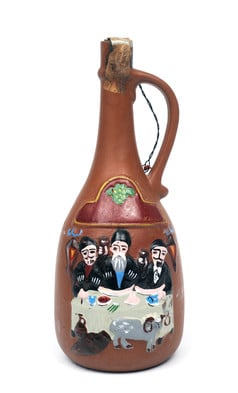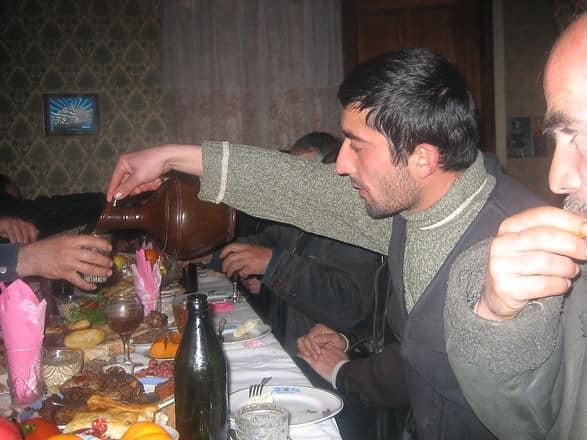Presented by Museum of the Peace Corps Experience and American University Museum
Early twenty-first century
Georgia
Clay, 10 x 4 x 4 in.
Courtesy of Rebecca Madden-Sturges
Georgia, Sagarejo 2005–07

My Georgian family’s house sits amid lush vines of watermelon and grapes. After more than 8,000 years of winemaking, farmers here still ferment grapes in large earthenware vessels called qvevri, which they bury in the ground until the wine ages to perfection. Most families, like mine, grow grapes and make their own wine. And they still serve it out of clay jugs. If these earthenware vessels distinguish the winemaking tradition in Georgia, the rituals around wine drinking are a big part of Georgian social life. I especially loved the communal supper parties.
A supra ( tablecloth) begins with the host laying a cloth on a table or on the ground and setting out abundant platters of food. Every supra revolves around multiple rounds of wine toasts. The designated toastmaster, or tamada, proposes the first toast and topic for discussion. Guests may respond, one by one, around the table. And then the tamada makes another toast, followed by more discussion, and the cycle repeats until late in the evening.
I attended many supras, but one in particular stands out. It was a birthday celebration for me hosted by my family and attended by my Georgian counterpart, Sopiko. The conversation around the table that evening took a turn that would set the course of my Peace Corps experience.
I had an idea, which I proposed to Sopiko: why don’t we help renovate the obstetrics–gynecology wing of the local hospital? It was badly in need of restoration and new medical equipment. Sopiko took my idea to the doctors. The hospital community was ready to commit to find funding. And so was I.
The lead surgeon and I met regularly to plan what the US embassy dubbed the “Grand Project.” I wrote a grant requesting funding to implement our plan. Our efforts paid off: the nonprofit Counterpart International donated $250,000 worth of slightly used hospital equipment, and the US State Department awarded $10,000 towards the renovation.
My Georgian counterparts worked cooperatively and community organizations in Sakartvelo and government offices joined forces to complete the project in fewer than six months. Today the new hospital wing is equipped to ensure the safe delivery of babies and protect the health of all women in the community.
I propose a toast to all those, especially young women, who will take their big ideas to the supra table one day and discover, as I did, that they can change the world.

The Committee for a Museum of the Peace Corps Experience is a 501(c)(3) private nonprofit organization. Tax ID: EIN # 93-1289853
The Museum is not affiliated with the U.S. Peace Corps and not acting on behalf of the U.S. Peace Corps.
Museum of the Peace Corps Experience © 2024. All Rights Reserved.